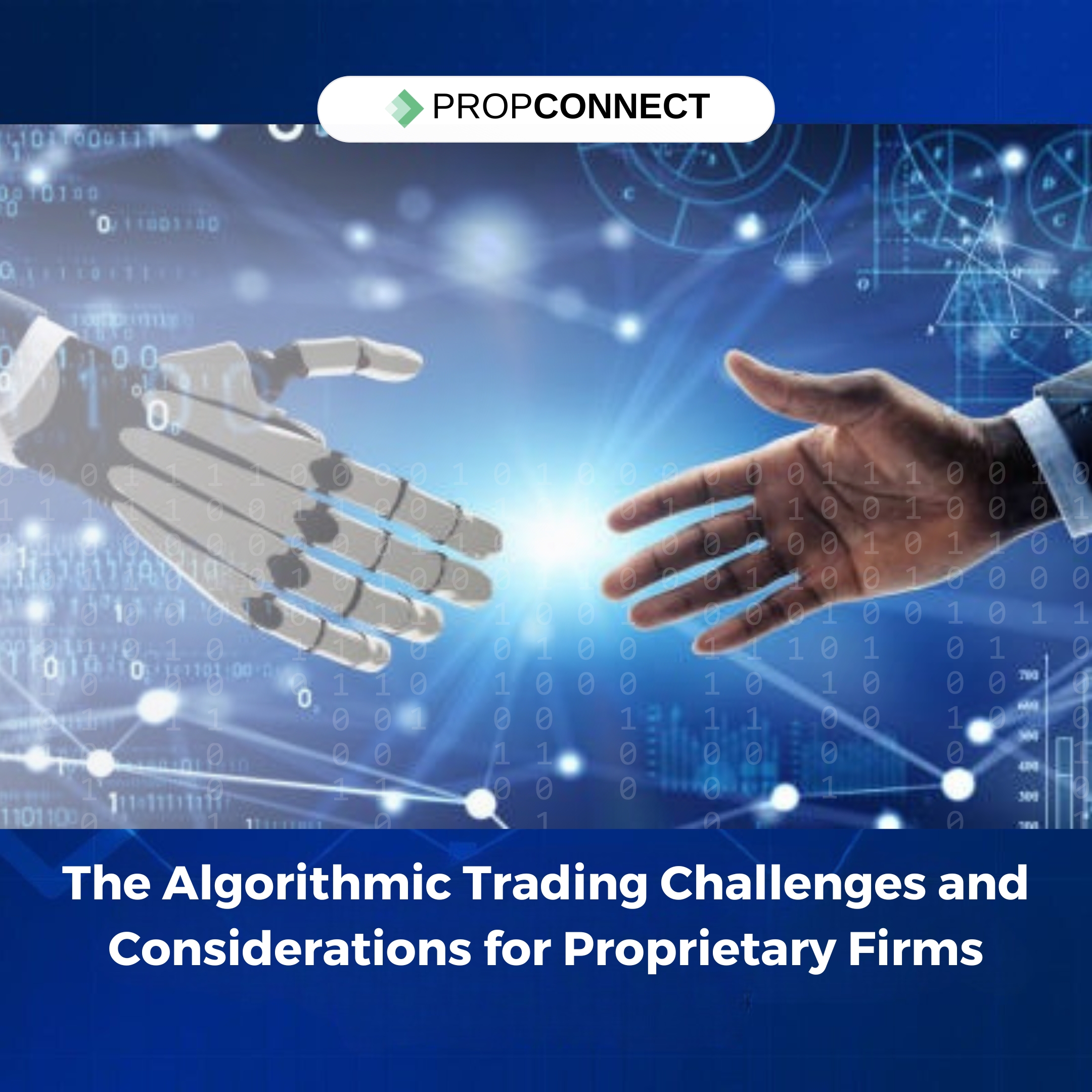Articles
The Algorithmic Trading Challenges and Considerations for Proprietary Firms
Algorithmic trading platforms need to be trustworthy. Technical problems, downtime, and system faults can result in significant financial losses. Prop firms must ensure the dependable operation of their trading systems by putting in place a robust infrastructure, rigorously testing everything, and having backup plans ready to address any technical issues.

Algorithmic trading, which provides proprietary trading firms with previously unheard-of levels of speed, precision, and scalability, has dramatically transformed the financial sector. However, there are several challenges with this useful tool. The article will cover the intricacies of algorithmic trading as well as the primary challenges and considerations that prop firms must make in order to proply implement automated trading systems.
The Complexity of the Algorithmic Trading System
Technical Challenges: A thorough understanding of statistical models, data structures, and computer languages is necessary for the development and administration of algorithmic trading systems. Proprietary companies need to invest in highly qualified people who can develop and optimize algorithms in order to ensure that they align with the company's aims and the current status of the market.
System Dependability: Algorithmic trading platforms need to be trustworthy. Technical problems, downtime, and system faults can result in significant financial losses. Prop firms must ensure the dependable operation of their trading systems by putting in place a robust infrastructure, rigorously testing everything, and having backup plans ready to address any technical issues.
Market dynamics and strategy optimization
Flexibility in Responding to Changing Market Conditions: Variations in volatility are common in financial markets, which are dynamic. Algorithmic trading strategies that are not adaptable enough to change with the market may lose some of their effectiveness. Algorithms must be continuously examined and adjusted if proprietary firms are to remain relevant and flexible in the face of shifting market conditions.
Overfitting and Curve Fitting: Backtesting against historical data is an essential phase in algorithm development to validate algorithm performance. Overfitting to historical data increases the likelihood that an algorithm will underperform in the present market environment. Prop enterprises need to strike a balance between historical performance and future-focused adaptability in order to avoid overfitting.
Data Integrity and Quality: The quality of the data used for analysis has a significant impact on the accuracy and dependability of algorithmic trading systems. Ownership firms are required to ensure that the data sources are accurate, current, and free of errors. Data integrity issues can lead to inaccurate evaluations and bad trading decisions.
Compliance and Management of Risk
Operational Risk: This type of risk is one that comes with trade automation. Unintentional consequences can result from network issues, data feed issues, or coding mistakes. Prop businesses need robust risk management protocols with fail-safes in order to lower the operational risks associated with algorithmic trading.
Model Risk: The models used in algorithmic trading are built on presumptions and historical trends. Model risk arises when certain assumptions are no longer true, and this could lead to less than optimal performance. Proprietary firms must regularly analyze and assess their models in order to lower model risk and ensure the continued efficacy of their algorithms.
Regulatory compliance: Within proprietary businesses, there is a regulatory framework that governs the financial markets. Algorithmic trading must abide by a number of regulations, such as those governing risk management, reporting requirements, and market surveillance. Algorithmic trading prop firms need to implement compliance measures and monitor regulatory changes.
Observation and Supervision
Real-Time Monitoring: Algorithmic trading systems require real-time monitoring in order to spot anomalies, deviations from predicted behavior, or sudden changes in the market. Prop firms need enhanced monitoring tools and procedures to ensure prompt response in the event of aberrant system behavior or market conditions.
Human control: Although algorithmic trading is becoming more and more automated, human control is still crucial. With algorithmic trading strategies, traders and risk managers need to monitor them closely, intervene when necessary, and make real-time adjustments depending on data from the market. Human judgment is crucial for controlling risks in general and reacting to unforeseen situations.
Aspects of Society and Ethics to Take into Account
Market Integrity: Algorithmic trading may be the cause of market volatility and liquidity imbalances. It is mandatory for proprietary enterprises to implement procedures aimed at upholding responsible and ethical trading practices and to consider the potential impact of their trading activities on market integrity.
Openness and Equitableness: The use of algorithms in trading raises questions about fairness and transparency. Prop companies need to maintain the trust of the wider financial ecosystem by abiding by ethical standards and being transparent about their trading activities, especially in the case of high-frequency trading.
In summary, algorithmic trading has given proprietary businesses unparalleled powers, but there are a lot of considerations and variables that must be proply balanced. Prop companies must address a number of crucial concerns, like technological complexity, risk management, flexibility in reaction to changing market conditions, and ethical considerations, in order to fully utilize the potential of algorithmic trading.
A broad range of abilities, including robust risk management frameworks, a commitment to ethical trading, and technological know-how, are necessary for success in algorithmic trading. Proprietary firms that proactively address these challenges and issues position themselves to prosper in the competitive and dynamic world of algorithmic trading, ensuring both ethical responsibility and operational efficiency.


